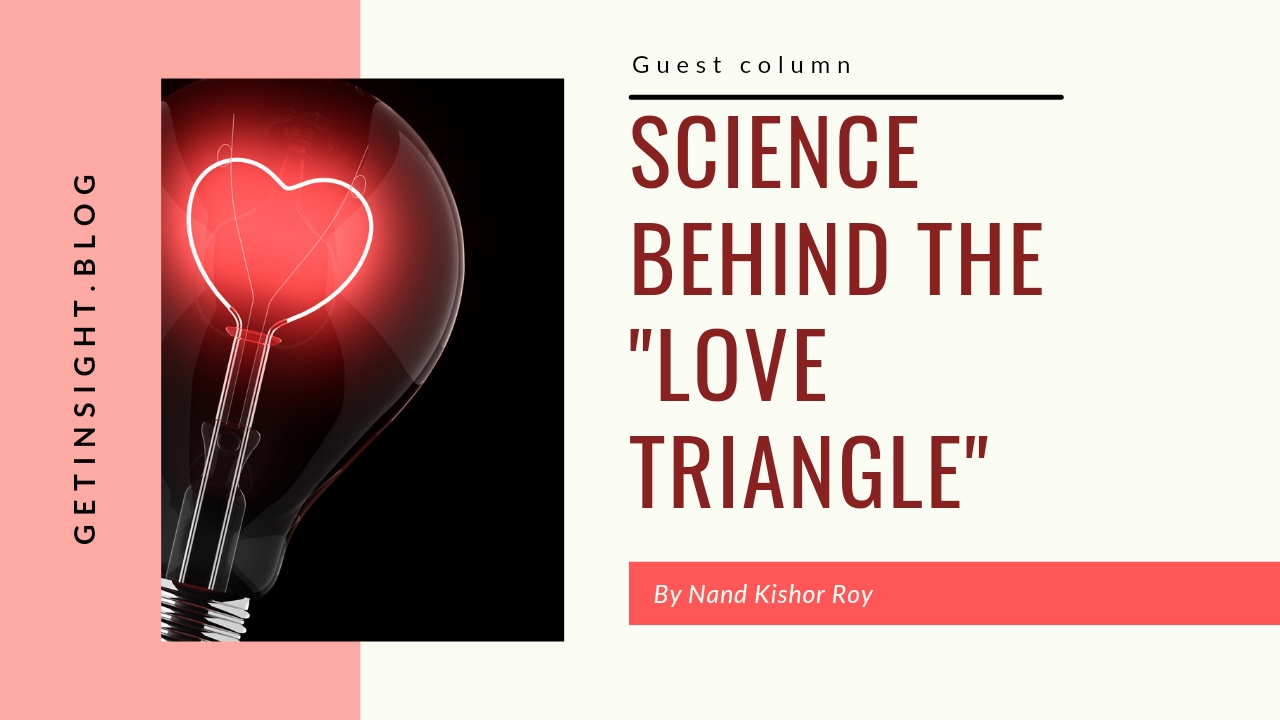As a typical Indian, when we hear the phrase the “love triangle”, the first thought which reflects in our mind is the idea presented by the classic Bollywood Hindi movie where three individuals are involved and they will create a melodrama intense emotion and love. But if you are expecting the same here then I need to put a disclaimer in the beginning that this is not about such drama and you should not be wasting your time reading here. However, one thing is sure I am going to discuss love with the perspectives of Psychology. Recently, while attending an online course on “Psychology of Personal Growth” offered by a mentor from Honk Kong University of Science and Technology I came across this term. I was fascinated to know about this aspect of love and thought to share with others. I must acknowledge the instructor of HKUST who shared this information and made it so interesting.
Although, the four letter word “love” is quite simple it is a complex phenomenon that is very difficult to understand. The religious person, scientist, and common human being have defined it differently and here I am going to discuss based on the perspective of a psychologist. In 1986, R Sternberg put forward a triangular theory of love to understand this complex phenomenon. He proposed that love has three components i.e. intimacy, passion, and commitment. The intimacy component is characterized by the warmth of the closeness of two individuals where they find pleasure in sharing the time and thoughts. The passion component includes the features of strong desire which can bring romance, physical attraction, and sexual consummation. The third component of commitment has the factors of the decision made by the individual to stay together irrespective of any prevailing situation and any cost. If two individuals lack all the three components it is called non love.

Based on the presence of these components of love the love is basically divided into seven different types:
Friendship/Liking:
If only the intimacy component is involved then it is friendship or liking type of love.
Infatuation:
It has the only feature of passion where intimacy and commitment component is missing.
Empty Love:
This only involves commitment with no signs of intimacy and passion.
Romantic Love:
This love has the factor of intimacy and passion.
Companionate Love:
It involves the component of intimacy and commitment but no passion.
Fatuous Love:
It is composed of passion and commitment with no intimacy involved.
Consummate Love:
This type of love has all the three components of intimacy, passion, and commitment.
| Love Types | Components | ||
| Intimacy | Passion | Commitment | |
| Friendship | YES | NO | NO |
| Infatuation | NO | YES | NO |
| Empty Love | NO | NO | YES |
| Romantic Love | YES | YES | NO |
| Companionate Love | YES | NO | YES |
| Fatuous Love | NO | YES | YES |
| Consummate Love | YES | YES | YES |
Although, it appears that these seven different types of love are a separate entity but they can be transitional in nature. For instance, Friendship or Infatuation love can be transformed into romantic love over time. The Empty love which is exemplified by the arranged marriages in some eastern culture where commitment factor is involved but with time the addition of intimacy can transform into companionate love and the addition of passion can shift it into Fatuous love and then the addition of both these factors can make an Empty love into Consummate love. Moreover, the reverse transition can also be possible, for example when the couple grows old the factor passion starts to disappear and the Consummate love can make a transit to Companionate love where the couples enjoy the warmth of each other presence with the essence of commitment.
The Consummate love is a perfect world scenario for a successful marriage and relationship and it is a bit hard to find. Now the question arises if not all the three components, which two components are important for a prosperous relationship. It is a difficult question to pose and the culture might influence in commanding the consequence. As a matter of fact, the western culture where love marriage is prevalent and the feature of romantic love is considered important for mate selection but in eastern culture where arranged marriage is primarily involved and features of romantic love is secondary. But if we consider the successful marriage in terms of divorce rate it is less in few eastern culture of India, Pakistan, China and Japan. It suggests that the attributes involved in love with the culture involved dictates the outcome of love and the responsible factors need to be studied further.
So in the end, I am leaving the readers with a question that what type of love they are in now and what features they consider important for a successful relationship?
Ref:
Sternberg R. A Triangular Theory of Love. Psychol Rev. 1986;93(2):119-135. doi: 10.1037//0033-295x.93.2.119
Copyright 2021, GetInsight.Blog

